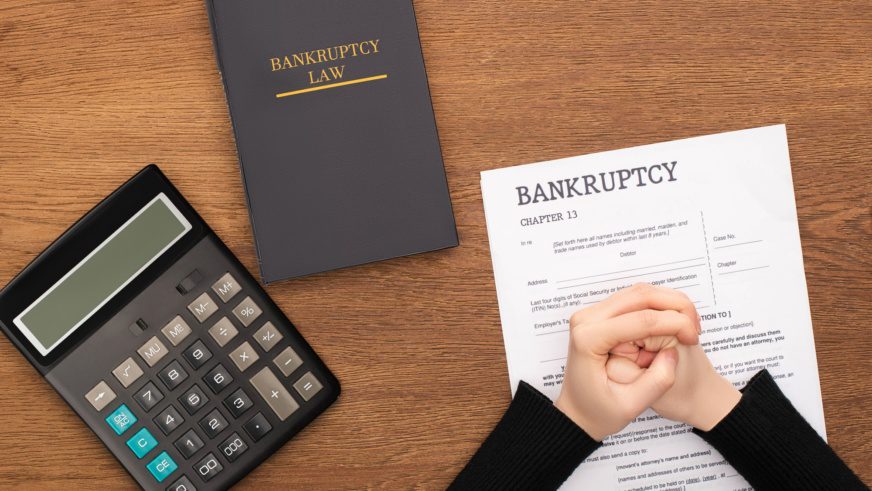
Every American wants to own their own house. It’s part of the American Dream, one that insists if you work hard enough then you can live a free, flourishing life. However, if you’ve previously applied for bankruptcy your own version of the American Dream might be a little different.
If owning your own home is a long and winding round, at the end of which lies a bright, welcoming light and a big, beautiful home, then personal bankruptcy is the giant sinkhole in the centre of that road, threatening to pull whatever into a helpless void.
How Bankruptcy Can Affect your Capability to Get a Home Mortgage
If you have a bankruptcy filing on your credit report then it acts as an alert to all future lenders, suggesting that you may not be the most accountable and trustworthy debtor. And if that’s what they think, why would they dedicate to lending you the 6-figure amount that you need for a house?
Debtors erroneously think that home loans are easy and that all mortgage providers should be willing to lend at all costs. After all, they’re not providing you 100% of your home price and if you default, they can just foreclose, get their refund, and move on.
The problem is, that the foreclosure process is exceptionally expensive, and a bank rarely gets its cash back. They require to file documents, pay upkeep expenses, and secure their residential or commercial property, which’s before they inevitably offer the house at a considerable loss.
Typically, the bank loses $50,000 per foreclosure. For that reason, it’s not something they will rush into and if there is any idea that you will not pay on your home loan, they will not give you a home loan.
What Result Does Personal bankruptcy Have on Your Credit?
As harmful as a personal bankruptcy filing can be for your credit, it’s the way it impacts your credit history that makes the most significant difference. If you have an “Extraordinary” credit rating, personal bankruptcy decreases your overall by as much as 240. If your credit rating is just “Excellent” or “Fair”, it can decrease by as much as 150 points.
That might not seem like a lot, however, it is when you compare it to other detrimental factors, such as tough questions (as much as 5 points) or a missed out on payment (50 to 90). Which’s simply the bankruptcy– it doesn’t represent any negative marks that may have impacted your score in the lead-up to the filing.
An insolvency discharge can remain on your credit report for as much as 10 years, although the impact that it has on your rating will decrease over time and after a couple of years, it will be minimal at best.
That’s a long period of time and a lot can happen in ten years. However, you need to see it from the loan provider’s viewpoint. A bankruptcy discharge means that you struggled to satisfy your payment obligations and sought government assistance to release all your financial obligations, therefore pardoning yourself and offering your creditors much less money than was concurred.
Your credit report exists to alert other lending institutions of your history, permitting them to make a notified choice, and as an insolvency discharge is such a substantial choice, it calls for an extended placement.
Think about it in this manner, if a mutual friend asks to obtain $1,000 and insists he will pay it back, although he has a dreadful monetary record and formerly begged for forgiveness of financial obligations worth simply $5 and $10, would you trust him and provide him with the money? Probably not, a minimum of not till he’s had a steady few years to prove he’s capable.
How Right After Bankruptcy Can You Get a Mortgage?
If you have filed for a personal bankruptcy discharge, which is supplied under a Chapter 13 insolvency case, you require to wait a minimum of 2 years before you can get an FHA loan. These are government-backed loans, however, and they tend to be a little more flexible when it concerns their terms.
If you get a mortgage from a bank, you may require to wait 3 or 4 years, depending on their requirements.
Just awaiting for the required length of time isn’t sufficient. You also need to get your credit report above 500 before you can get approved for an FHA loan and 640 for conventional loans. The higher it is, the better. In the case of an FHA loan, you’ll need a deposit of 10% if your credit history is less than 580 and 3.5% if not, so it can make a massive distinction.
It’s likewise important to remember that lending institutions provide better rates to borrowers with strong credit reports. On the surface, a credit score of 640 may not seem much different to among 840. After all, in both cases, you’ll be asked to supply the exact same down payment, given the exact same total and asked to comply with comparable terms.
However, credit history of 840 is most likely to get a far better rate of interest. The difference may only be 0.5% and even 1%, however where home mortgages are concerned that might account for thousands of dollars over the lifetime of the loan.
For how long is the Home Loan Approval Waiting Period?
The home loan approval process can take anywhere from 1 month to several months. There are a number of steps to finish in this time, but primarily it’s simply a case of biding your time and hoping that things go your way.
In the first instance, you require a prequalification letter, followed by preapproval, the latter of which will typically need you to send files such as your social security number, driver’s license, and tax returns.
The last approval procedure will then start, and this generally takes simply a couple of weeks to finish, assuming there are no extenuating situations.
Choices for Getting a Home Mortgage After Personal bankruptcy
There are a couple of different kinds of mortgages you can make an application for after a personal bankruptcy filing. Your alternatives will depend on your credit score, earnings, deposit, and the quantity of time that has actually passed given that you submitted.
Traditional Loans
A traditional home mortgage is one that’s not guaranteed by the federal government of the United States. To account for this, you will be required to pay private home mortgage insurance, a responsibility that stops as soon as you reach 20% equity. These loans are offered by banks, all of which have their own criteria regarding applications that follow bankruptcy filings.
Federal Housing Authority (FHA) Loan
An FHA loan is insured by the federal government and aimed at borrowers with lower credit scores and down payments. You need a 10% down payment if you have a rating of 500+ and 3.5% if you have a rating of 580. The rates of interest likewise enhance as your rating enhances.
You just require to wait 2 years after filing before you can apply for an FHA loan.
United States Department of Agriculture (USDA) Loan
These home loans are focused on low- and middle-income borrowers residing in the backwoods. It supplies a low-interest and zero-down payment choice and you require to wait simply 3 years after filing for Chapter 7 or 12 months after filing for Chapter 13.
Veteran’s Affairs (VA).
If you are a United States veteran then you might receive a VA loan, which is provided without a deposit and doesn’t need a particular credit report. You just need to wait 2 years after filing, but these loans have a long list of criteria and you may not qualify, even if you are a United States veteran.
Tips to Get Approved for a Home Mortgage After Insolvency.
To increase your possibilities of getting a home loan after bankruptcy, keep the following pointers in mind:
Improve Your Credit Report.
Bankruptcy doesn’t give you a clean slate as such, however, it does offer you a possibility to reconstruct your credit from a brand-new perspective. After personal bankruptcy, you need to have a new outlook, with enhanced monetary education and an understanding of how bad things can get and how you can avoid them.
Start slow and work on improving your credit rating and keeping debt to a minimum. You will be offered high-interest rate credit cards by lending institutions that target bad credit debtors, however, you need to overlook these and get a safe charge card rather.
A protected credit card works just like an unsecured credit card, only you do not have an unlimited credit line, and everything is protected versus a money deposit. A small credit contractor loan can likewise assist you to get back on your feet after filing.
Deal with your Debt-to-Income Ratio.
Your debt-to-income score is utilized by home mortgage loan providers to determine how ready you are to make the required payments each month. They will determine your overall financial obligation and then compare it to your overall gross earnings.
If you have debt payments of $500 a month and your income is $5,000, your rating is 10%, which is great. Home mortgage lenders will try to find scores less than 43%, with anything under 30% being preferred. It’s likewise worth noting that your future home mortgage payment will be added on top of this rate.
Keep Your Payment History Strong.
Your payment history accounts for a greater portion of your credit score than anything else. You need to keep this strong if you’re going to get a house after personal bankruptcy.
Make certain you fulfil all your payments on time, never ever leave anything late, and conflict whatever was not your fault. You need a clean and steady payment history to construct a strong credit history.
Keep Debt to a Minimum.
Whenever you obtain a brand-new credit card or loan, your credit report takes a hit. Difficult inquiries and brand-new accounts can reduce your rating substantially and it may take a number of months for these effects to reduce.
Keep all new accounts to an absolute minimum and open just the ones that are required.
Develop an Emergency Fund.
Start saving some money to construct an emergency fund as this will help you if you ever fall behind with home loan payments. Every cent that you don’t invest in costs, financial obligations or other basics needs to go towards your emergency fund. And if you truly do not have any money left over after all those commitments have been satisfied, you can’t pay for a house.
Remember what we said about debt-to-income above? The goal is to get this to 30%. That indicates that if you have earnings of $5,000, it requires to be $1,500 or less. Presuming it’s precisely $1,500 when the mortgage payments and other debts have actually been factored into the formula, and we include another $1,500 for food, costs, clothing and the occasional day out, that leaves $2,000.
Even if we put $1,500 more to one side to cover other expenses, that still leaves $500 that you can position in an emergency fund. Throughout a year, that emergency fund will grow to $6,000. In three years, you’ll have $18,000.
If you’re ever hit with medical costs, you lose your job, or you suffer some other extreme difficulty, you can utilize that money to cover your mortgage payments for a variety of months until you get back on your feet.
Summary: Playing the Waiting Game.
When declaring insolvency, you seldom stop to consider the manner in which it might impact your opportunities of getting a mortgage. You can’t pay your debts, insolvency provides you with a solution– that’s basically the whole thought process.
Fortunately is that bankruptcy may benefit you more in the long run, as now you don’t have all those financial obligations to fret about and have looked for an easier and more manageable method of clearing them. In a few years, after you have actually invested some time restoring your credit and looking at your alternatives, you can start trying to find a house and consider making the dedication.
Time is a great healer where bankruptcy is concerned.




